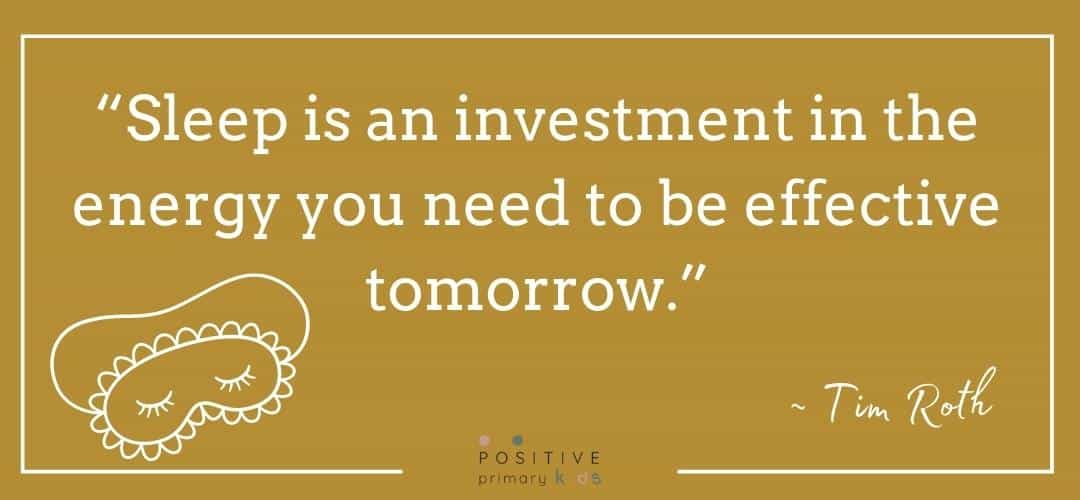How Getting Quality Sleep Benefits Children’s Health and Development
Did you know that almost a third of primary school-aged children aren’t getting enough sleep? A third?! 🤯
A good night’s sleep isn’t just an opportunity for our bodies to rest and repair, research shows that it’s also essential for processing and reinforcing learning.
But how exactly does sleep influence how well children learn? And is your child getting enough restorative sleep?
In this post, I’ll discuss 10 ways getting quality sleep benefits your child’s health, development and capacity to learn.
- Why is Getting Quality, Restorative Sleep Important?
- 10 Benefits of Your Child Getting Quality Sleep?
- Not all Sleep is Restorative – Understanding Sleep Stages
you can jump straight to each section by clicking the links above
If you haven’t read my recent post about basic needs that must be met for successful learning, you might want to check it out before coming back to this one.
Why is Getting Quality, Restorative Sleep Important?
According to the NHS children aged 6-12 require between 9-11 hours of sleep every night. Despite this, research by the British Nutritional Foundation found that 32% of primary school pupils get fewer than the recommended minimum of 9 hours.
That’s staggering!
After a long school day packed with learning, playing and social interaction, kids are usually pretty tired. They have a lot of new experiences and information to process and store in their brains. Often this busyness continues with after-school activities, homework, playing with friends or pets and family routines. At the end of each day, kids need enough quality sleep so that they can wake up the next morning refreshed and ready to take on the day.



10 Top Benefits of Your Child Getting Quality Sleep
#1 – Quality sleep improves concentration and productivity
Good sleep enhances our ability to think clearly and react quickly, improves problem-solving and decision making skills and supports overall brain function.
#2 – Sufficient sleep improves memory
When we sleep, our minds are still active whilst our bodies rest. Our brains are actually making sense of what happened during the day, consolidating and storing information and even solving problems.
#3 – A good night’s sleep refreshes and energises
Getting restorative sleep means that you wake up feeling fresh, rested and ready to take on the day ahead.
#4 – Restorative sleep strengthens the immune system
During sleep our bodies produce proteins called cytokines and white blood cells called T-cells. These create an immune response to infection and inflammation to help protect us against illness.
#5 – Quality sleep repairs our bodies
Whilst we sleep, cells regrow and repair muscles and support tissue growth allowing muscle recovery and injury restoration.
#6 – Sleep influences emotions and supports good mental health
People who get quality sleep (or ‘get up on the right side of the bed’) feel happy, rested and energetic. They are more resilient to mood shifts, irritability, depression and anxiety.
#7 – Sufficient sleep improves physical performance
When we sleep and our muscles relax they can recover. A well-rested body has more power, better coordination, faster muscle recovery from exercise and more rapid reaction speeds.
#8 – Sleep influences heart health
When we don’t get enough sleep, our bodies release cortisol. This is our main stress hormone. It increases heart rate and makes us feel anxious. Cortisol prevents the heart from resting during sleep and interferes with how well it functions.
#9 – Being well-rested keeps us safe
When we don’t get enough sleep, our reaction speeds are impaired. Slow reactions increase the likelihood of being clumsy and having accidents.
#10 – Sleep can even influence weight
Insufficient sleep increases levels of a hormone called ghrelin. Ghrelin makes us feel hungry and increases appetite, so we eat more calories – especially because less healthy food choices become more tempting. On top of that, when we are tired, physical activity is less appealing so those calories don’t get burned.

Not All Sleep is Restorative!
Understanding Sleep Stages
There are two important aspects to consider when it comes to sleep quality. These are: quantity of sleep and quality of sleep. Quantity of sleep is the amount of sleep that you get whilst the quality of sleep is to do with how quickly you fall asleep and if you stay asleep, undisturbed through the night.
Throughout the night, we go through different four stages of sleep. These stages then repeat on a cycle until we wake up. But not all of these stages are restorative.
Only the last two stages of the sleep cycle are thought to be restorative. The third stage is when your body repairs physically, builds bone and strengthens the immune system. The fourth stage is when you usually have dreams. This is when your brain processes information and is an essential stage for learning and memory.
The Sleep Cycle
The first two stages are light sleep stages. During these, you can wake up easily. Stage one is when you are drifting between being awake and falling asleep. During stage two physical changes happen: breathing and heart rates begin to slow and body temperature decreases.
The third stage is when the deepest sleep begins. This is when our bodies are completely relaxed. Eye movement stops, breathing and heart rates are at their slowest. Stage three sleep is when the immune system strengthens, growth hormones are released and our bodies repairs and restore old and damaged tissue and cells.
The final stage is the REM (Rapid Eye Movement) stage. This is the main dreaming stage, where vivid dreams occur. During REM, breathing, heart rate and brain activity increase. Limb muscles are temporarily paralyzed during this stage.
Enjoying this topic? Here are some related posts:
Final thoughts on the importance of quality sleep…
I don’t know about you, but thinking about all these sleep benefits makes me want to hit the hay!
As you’ve seen, prioritising sleep is essential for health, wellbeing, the ability to successfully tackle our days and overall quality of life. Taking care of your child’s sleep is just as important as their nutrition and exercise.
It’s important to note that as all children are different, the exact amount of sleep that they need will vary. But the fact remains that getting enough quality restorative sleep is essential for good health and mood, being alert, concentrating and functioning well through the day.
Is your child getting a minimum of 9 hours of sleep every night? If not, take a look at this follow-up post packed with tips for creating a bedtime routine for better sleep.
What are your sleep tips?
Have you got any sleep tips to share with other parents? What is your advice that would help their children get their full 9-11 hours sleep of restorative sleep?
Let me know in the comments below – I’m looking forward to reading your tips!
Recommended Reading On This Topic:
- Why Sleep Should Be Every Student’s Priority – BBC Future
- Stages of Sleep – Sleep Foundation





